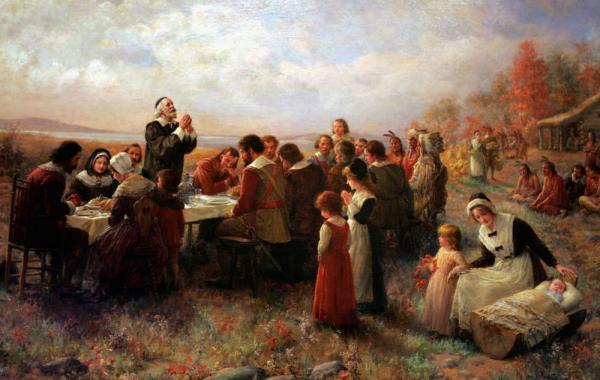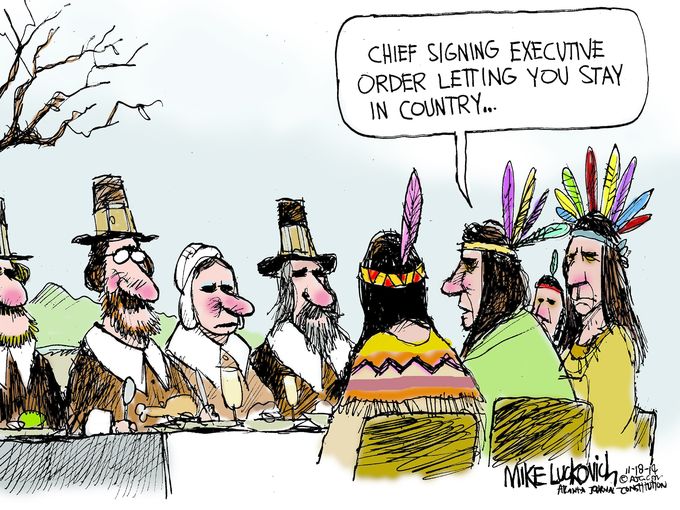Harvest festivals can be found among all peoples of the world and every religion, but what we call Thanksgiving has its origins in the English Protestant Reformation. Here’s an extended Wikipedia excerpt:
“In the English tradition, days of thanksgiving and special thanksgiving religious services became important during the English Reformation in the reign of Henry VIII and in reaction to the large number of religious holidays on the Catholic calendar. Before 1536 there were 95 Church holidays, plus 52 Sundays, when people were required to attend church and forego work and sometimes pay for expensive celebrations. The 1536 reforms reduced the number of Church holidays to 27, but some Puritans wished to completely eliminate all Church holidays, including Christmas and Easter. The holidays were to be replaced by specially called Days of Fasting or Days of Thanksgiving, in response to events that the Puritans viewed as acts of special providence. Unexpected disasters or threats of judgement from on high called for Days of Fasting. Special blessings, viewed as coming from God, called for Days of Thanksgiving. For example, Days of Fasting were called on account of drought in 1611, floods in 1613, and plagues in 1604 and 1622. Days of Thanksgiving were called following the victory over the Spanish Armada in 1588 and following the deliverance of Queen Anne in 1705. An unusual annual Day of Thanksgiving began in 1606 following the failure of the Gunpowder Plot in 1605 and developed into Guy Fawkes Day.”
Wikipedia goes on to remind us that the American version of Thanksgiving dates back “to a poorly documented [sic; New Englanders, please don’t take umbrage]1621 celebration at Plymouth in present-day Massachusetts. The 1621 Plymouth feast and thanksgiving was prompted by a good harvest.” We’re advised that
“Thanksgiving proclamations were made mostly by church leaders in New England up until 1682, and then by both state and church leaders until after the American Revolution…”
and that “… As President of the United States, George Washington proclaimed the first nation-wide thanksgiving celebration in America marking November 26, 1789, ‘as a day of public thanksgiving and prayer to be observed by acknowledging with grateful hearts the many and signal favours of Almighty God’.” (exactly 225 years ago to this day).
The first American Thanksgiving has been a subject for artists ever since. Here are two examples; one from Jennie Augusta Brownscombe, dated 1914:
 and another from just yesterday, by Mike Luckovich in The Atlanta Constitution (and reprinted in USA Today):
and another from just yesterday, by Mike Luckovich in The Atlanta Constitution (and reprinted in USA Today):
For the moment, let’s zero in on the cause of that 1621 celebration: a good harvest, following a particularly bitter winter, which likely caught the Pilgrims by surprise. Europeans largely operated on a latitude theory of climate in those days. Unaware of the role played by the Gulf Stream in moderating European climate, they compared Plymouth’s 420N latitude with the much higher 51.50N latitude of London and erroneously concluded that American winters should be a walk in the park.
As for the good harvest, it was attributed to what today we would call “technology transfer[1]” from the indigenous people of the area to the Pilgrim newcomers. Much was owed to a “technology broker” by the name of Tisquantum[2], a member of the Patuxent tribe, part of the Wampanoag Confederacy. Tisquantum, or Squanto as he was also known, had shown the Pilgrims how to plant their maize using menhaden as fertilizer, as the natives did. He threw in other agricultural technology transfer as well, also sharing with the Pilgrims native techniques for catching the menhaden and other fish and game.
The plan here at LOTRW in future posts is to take up the topic of technology transfer and its close cousins applied research, development, and research to operations (or R2O). There’s much to say, but one brief note in honor of the day: we’re sometimes reminded by historians and other social scientists that in technological advance and tech transfer there are winners and losers; not everyone benefits equally from all exchanges. And today’s technology brokers of a cynical bent might note that according to some accounts, Tisquantum was accorded a measure of distrust from all sides for his pains, and perhaps even poisoned by the Wampanoag, leading to his death on November 30, 1622.
In the meantime, enjoy Thanksgiving, and as you look around at family and friends and give thanks for the bounty that surrounds you, remember to add a word of gratitude for the centuries of R2O and all those technology brokers who have made possible so much of what you enjoy.
____________________________________
[1]Technology transfer may be defined as the process of transferring skills, knowledge, technologies, methods of manufacturing, samples of manufacturing and facilities among governments or universities and other institutions to ensure that scientific and technological developments are accessible to a wider range of users who can then further develop and exploit the technology into new products, processes, applications, materials or services.
[2] A Smithsonian article tells us that More than likely Tisquantum was not the name he was given at birth. In that part of the Northeast, tisquantum referred to rage, especially the rage , the world-suffusing spiritual power at the heart of coastal Indians’ religious beliefs. When Tisquantum approached the Pilgrims and identified himself by that sobriquet, it was as if he had stuck out his hand and said, Hello, I’m the Wrath of God.


Great job Bill
peace
Dick
enough is abundance
Thanks, Dick… and thanks for being a person of peace, a person who creates peace and adds to the world’s store in myriad ways. Happiest of Thanksgivings to you and Kris.